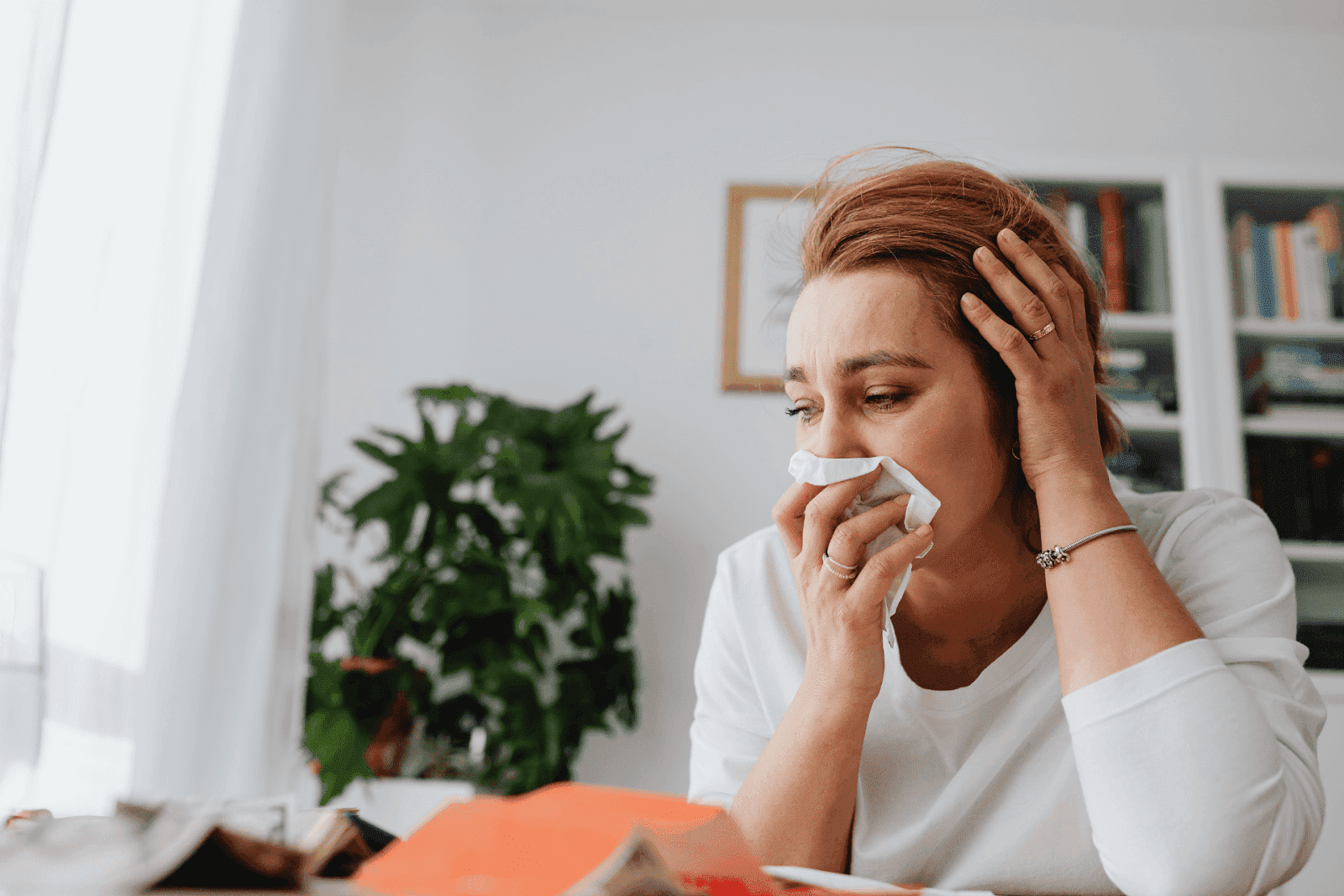Why Do Allergies Make Me Feel So Tired?
Allergies are a common nuisance for millions of people worldwide, especially during certain seasons or in environments filled with allergens. While sneezing, itchy eyes, and [...]
Read More
Medically reviewed by Alan Lucks | MD, Alan Lucks MDPC Private Practice - New York on October 12th, 2025.
Your immune system releases histamine and inflammatory cytokines during allergic reactions, which directly suppress energy production at the cellular level and can persist for 6-8 hours after exposure ends.
Nasal congestion reduces airflow by up to 50%, forcing mouth breathing during sleep which decreases oxygen saturation and fragments sleep cycles, particularly deep REM stages.
Second-generation antihistamines like cetirizine or loratadine (10mg daily) are less sedating than older versions and work best when taken before peak pollen times, typically evening doses for morning relief.
Sleep apnea occurs in 40% more people during peak allergy seasons due to inflamed nasal passages, creating a cycle where poor sleep weakens immune function and worsens allergic responses.
Anti-inflammatory foods rich in quercetin (onions, apples) and omega-3 fatty acids can reduce systemic inflammation by 20-30% when consumed regularly, complementing medical treatment.
Allergies are a common nuisance for millions of people worldwide, especially during certain seasons or in environments filled with allergens. While sneezing, itchy eyes, and runny noses are well-known symptoms, many people also experience an overwhelming sense of fatigue. This exhaustion can sometimes feel as debilitating as the physical symptoms themselves. But why do allergies make you feel so tired? Understanding this connection can help you manage your symptoms better and regain your energy.
 How Allergies Trigger Fatigue
How Allergies Trigger FatigueWhen your body encounters allergens, such as pollen, dust mites, pet dander, or mold, it triggers an immune response. This reaction is designed to protect you, but it can also have unintended consequences like fatigue.
Allergies occur because your immune system mistakenly identifies harmless substances as threats. To defend against these perceived invaders, it releases chemicals such as histamine. Histamine causes inflammation, swelling, and the classic allergy symptoms like sneezing and congestion.
This immune activation requires energy. Your body diverts resources to fight off the allergen, which can leave you feeling drained. The constant state of alertness and inflammation can tax your system, leading to tiredness that lingers throughout the day.
Inflammation is a natural part of the immune response, but chronic or intense inflammation can interfere with your body’s normal functions. In the case of allergies, inflammation can affect your respiratory system, making it harder to breathe deeply and get enough oxygen. Reduced oxygen intake can contribute to feelings of fatigue.
Moreover, inflammation can disrupt your sleep quality. Nasal congestion, coughing, and other allergy symptoms often worsen at night, leading to restless sleep or frequent awakenings. Poor sleep further compounds daytime tiredness, creating a vicious cycle.
Additionally, the fatigue experienced during allergy season can be exacerbated by the psychological effects of dealing with persistent symptoms. The mental toll of managing constant discomfort can lead to increased stress and anxiety, which in turn can sap your energy levels. This emotional strain can make even simple tasks feel overwhelming, further contributing to the sense of fatigue. It’s not just the physical symptoms that drain you; the mental burden of allergies can be just as exhausting.
Furthermore, the seasonal nature of many allergens can lead to fluctuations in energy levels throughout the year. For individuals sensitive to pollen, the arrival of spring may bring not only blooming flowers but also a wave of fatigue that can last for weeks. As the body battles these seasonal triggers, it may struggle to maintain its usual energy levels, leaving individuals feeling sluggish and unmotivated. Understanding these patterns can help in managing symptoms and finding effective strategies to cope with allergy-induced fatigue.
Many people turn to over-the-counter or prescription medications to manage their allergy symptoms. While these treatments can provide relief, some may also contribute to feelings of tiredness.
Antihistamines are among the most common allergy medications. They work by blocking histamine receptors to reduce symptoms like itching and sneezing. However, some older-generation antihistamines, such as diphenhydramine, are known to cause drowsiness as a side effect. This sedative effect can make you feel sleepy or sluggish during the day.
Newer antihistamines tend to be less sedating, but individual reactions vary. If you find your allergy medication is making you excessively tired, it’s important to discuss alternative options with a healthcare provider.
Decongestants and corticosteroids are other common allergy treatments. While decongestants can sometimes cause jitteriness or insomnia, corticosteroids may also affect energy levels indirectly by influencing mood and sleep patterns. Understanding how your medications impact your body can help you balance symptom relief with maintaining energy.
Additionally, the impact of allergy medications on fatigue can be compounded by the underlying allergy symptoms themselves. Chronic nasal congestion, for instance, can disrupt sleep quality, leading to daytime fatigue that may be mistaken for a side effect of medication. This interplay between allergies and medication side effects highlights the importance of a comprehensive approach to treatment, which may include lifestyle changes such as improving sleep hygiene or exploring natural remedies alongside conventional medications.
Moreover, it’s essential to consider the timing of medication intake. Taking certain allergy medications at night can mitigate drowsiness during the day, allowing for better management of both symptoms and energy levels. Patients should work closely with their healthcare providers to tailor a regimen that not only alleviates allergy symptoms but also supports overall well-being and vitality.
For those with persistent allergies, the toll on energy can be significant. Chronic allergic rhinitis or other long-term allergic conditions can lead to ongoing inflammation and disrupted sleep, both of which contribute to sustained fatigue.
Allergic rhinitis, commonly known as hay fever, affects millions of people and is characterized by nasal congestion, sneezing, and itchy eyes. The nasal congestion can make breathing difficult during sleep, leading to conditions like sleep apnea or simply fragmented sleep. Over time, this sleep disruption can cause daytime sleepiness and reduced cognitive function.
Living with chronic allergies and the associated fatigue can also impact mental health. Persistent tiredness can lead to irritability, difficulty concentrating, and even symptoms of depression or anxiety. Addressing allergies effectively is, therefore, essential not just for physical health but for emotional well-being as well.
While allergies can make you feel tired, there are several strategies to help manage this fatigue and improve your quality of life.
Effective allergy management is key to reducing fatigue. This involves identifying and avoiding allergens when possible, using appropriate medications, and monitoring symptoms closely. If you’re unsure about the best treatment plan, consulting a healthcare provider can make a big difference.
For convenient and affordable access to medical advice, consider using telehealth services like Doctronic.ai. Doctronic offers 24/7 video visits with licensed doctors across all 50 states, providing expert guidance on allergy management and treatment options without the need to leave your home.
Since allergies often disrupt sleep, focusing on good sleep hygiene can help combat fatigue. This includes maintaining a consistent sleep schedule, creating a comfortable sleep environment, and minimizing exposure to allergens in the bedroom. Using air purifiers and hypoallergenic bedding can also reduce nighttime symptoms.
Hydration supports your body’s ability to flush out allergens and reduce inflammation. Eating a balanced diet rich in antioxidants and anti-inflammatory foods can also support your immune system and energy levels.
If your allergy symptoms and fatigue are persistent or worsening, it’s important to seek professional help. Sometimes, what feels like allergy-related tiredness could be a sign of other underlying conditions, such as sleep apnea, chronic sinus infections, or even more serious health issues.
Using a trusted telehealth platform like Doctronic.ai can provide quick access to medical experts who can evaluate your symptoms, offer a diagnosis, and recommend personalized treatment plans. This service is especially valuable for those who want fast, convenient care without the hassle of traditional doctor visits.
Doctronic.ai is revolutionizing healthcare by combining cutting-edge AI technology with expert medical care. As the #1 AI Doctor, Doctronic offers free AI doctor visits that provide immediate, evidence-based answers to your health questions. This can be incredibly helpful for understanding your allergy symptoms and fatigue.
Beyond AI consultations, Doctronic provides affordable telehealth video visits with licensed doctors available 24/7 nationwide. This means you can get personalized care anytime you need it, ensuring your allergies and related fatigue are managed effectively and promptly.
With over 10 million users and rapid growth, Doctronic is a trusted resource for modern, patient-centered care. Visit Doctronic.ai today to experience healthcare that remembers you and delivers the latest in medical knowledge quickly and conveniently.
 Don’t Let Allergies Drain Your Energy
Don’t Let Allergies Drain Your EnergyFeeling tired when you have allergies is a common experience rooted in your body’s immune response, inflammation, medication effects, and disrupted sleep. Understanding these factors can empower you to take control of your symptoms and improve your energy levels.
Effective allergy management, good sleep habits, and professional medical advice are key to overcoming allergy-related fatigue. Telehealth services like Doctronic.ai offer accessible, expert care that fits into your busy lifestyle, helping you feel better faster.
Don’t let allergies drain your energy. With the right approach and support, you can breathe easier and reclaim your vitality.
Don't let allergy-related exhaustion take over your life. With Doctronic, you can access the most advanced AI-driven medical advice in seconds, tailored to your unique symptoms and health history. Our AI Doctor is designed to provide you with the latest, peer-reviewed medical insights, offering personalized care that's always available, 24/7. For those times when you need more than AI, our affordable telehealth video visits connect you with real doctors for comprehensive care. Experience the future of healthcare and skip the line. Talk to an AI Doctor Now, for free.
Fatigue results from your body's inflammatory response depleting cellular energy while congestion disrupts restorative sleep cycles. Taking antihistamines proactively and optimizing sleep environment with air purifiers breaks this exhausting cycle. If persistent fatigue interferes with daily activities despite treatment, Doctronic can help determine if additional evaluation is needed.
Allergies are a common nuisance for millions of people worldwide, especially during certain seasons or in environments filled with allergens. While sneezing, itchy eyes, and [...]
Read More